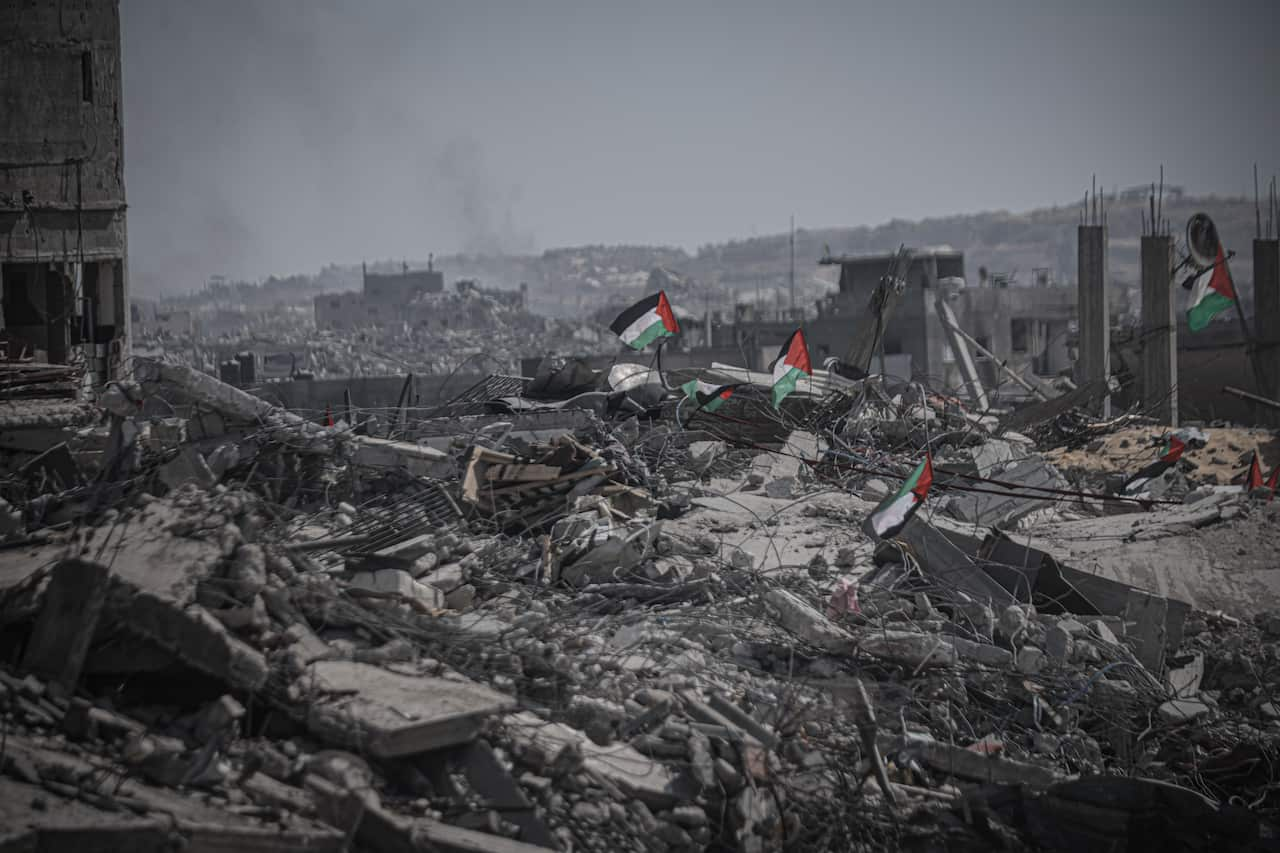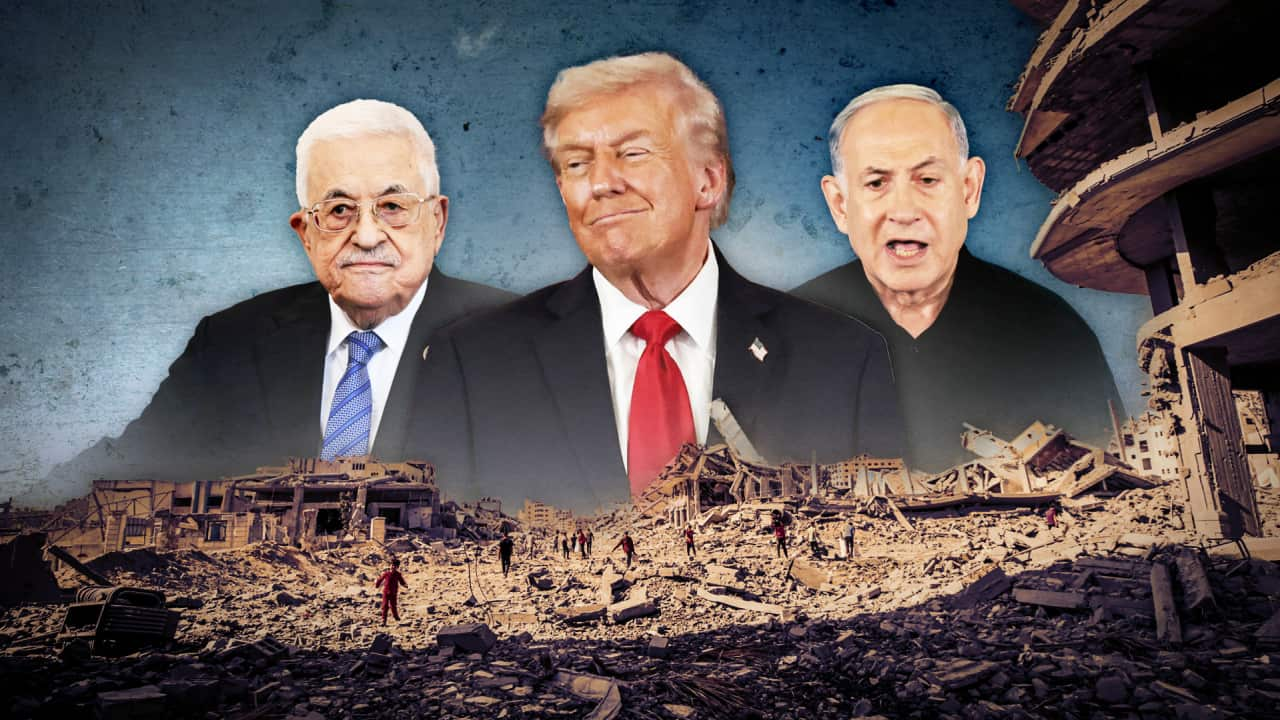After two years of war, the last surviving hostages in Gaza were returned to Israel by Hamas on Monday and a peace deal was hailed, as a delicate ceasefire held for another day. But experts say that the hostage and Palestinian detainee release was likely the easiest part of a far more complicated process — one with more questions than answers.
Eyal Mayroz, a senior lecturer in peace and conflict studies at the University of Sydney, told SBS News that Hamas no longer has hostages it can use as a "bargaining chip" and is "not as powerful as it used to be" but potentially more unpredictable.
One other thing was clear, Mayroz said: United States President Donald Trump's continued influence will be critical for any chance at a lasting peace in the region. As Trump travelled to Israel from Washington on Monday, he told reporters "the war is over".
Trump "holds the key" to keeping the proposal moving, but the rest of the plan is "full of holes and ambiguities", Mayroz said, adding that Trump's language is part of a strategy.
"The gaps are so wide still between the parties, he's trying to, rather than describe realities, create a fictional reality to try to force reality to conform with that statement," he said.
What's happened so far
Under the first phase of a peace plan brokered by the US, Israel was to release Palestinian prisoners and detainees in exchange for all living and deceased hostages held by Hamas.
Those conditions were partially met on Monday, after 20 living hostages were handed over and nearly 2,000 Palestinians were released from Israeli jails, setting off jubilant scenes in both Tel Aviv and the occupied Palestinian territories.
Around 1,700 of the Palestinians released had been detained without charge under "administrative detention" policies by the Israeli army in Gaza during the war, and around 250 were Palestinian prisoners, including some convicted by Israeli courts of killing Israelis.
But Hamas returned the remains of just four deceased Israeli hostages, with the whereabouts of more than 20 still unknown.
In accordance with other conditions of the initial phase, Israeli troops have also begun a withdrawal from Gaza, and humanitarian aid has started to flow into the strip. But the exact nature of the Israeli withdrawal is not yet clear.
Trump and a group of other world leaders, including Palestinian Authority President Mahmoud Abbas, met in Egypt on Monday to discuss a peace plan for Gaza's future.
What's supposed to happen next?
Trump's 20-point plan also calls for the rehabilitation of key infrastructure such as water, electricity and sewage systems and hospitals, establishing a temporary governing system for Gaza, and the disarmament of Hamas.
But the details were scant, and many sticking points will need to be addressed.
"What we're looking into now is a long process of negotiations that will only survive if Trump personally remains engaged, and pressures both the Israelis and Hamas through the Arab states," Mayroz said.
Hamas agreeing to lay down its arms will be "the main challenge", he said, because "for Israel, security is the most important thing, and there is no real security as long as Hamas carries weapons".
The current structure of Hamas' leadership is a mystery, he added, making it difficult to know what the group may agree to. But without the hostages, the group may have "lost their bargaining chip".
On Monday, Hamas spokesperson Hazem Qassem urged Trump and the mediators of the Gaza deal to "continue monitoring Israel's conduct and to ensure it does not resume its aggression against our people".
Establishing security in the strip
Jessica Genauer is a senior lecturer in international relations at Flinders University. She said the ceasefire will be "very fragile in the coming days and weeks", particularly now that the hostages have been returned.
The situation will require ongoing pressure from Trump on Israeli Prime Minister Benjamin Netanyahu, she told SBS News.
If the ceasefire holds, the next challenge will be governance and security.
"What will happen in terms of securing the Gaza Strip? Will there be some kind of Palestinian peace force? Will there be some kind of international peace force? Will Hamas fully withdraw from the Gaza security apparatus? Those points are not yet clear," she said.
The US plan calls for a security force made up of personnel from surrounding Arab countries, along with Palestinian police trained in Jordan and Egypt.
"But it's not entirely clear whether that would work or what would really be the preference of Palestinians themselves," Genauer said.
Rebuilding will require a 'concerted international effort'
While recovery operations have begun in Gaza, much of which has been reduced to rubble by Israel over the past two years, more serious rehabilitation of infrastructure and reconstruction of buildings and other services is going to need "a much more concerted international effort", Genauer said.
Clear security will need to be established before any large-scale reconstruction can begin, she added.
The reconstruction of Gaza will bear an estimated cost of more than US$50 billion ($77 billion), according to an assessment released earlier this year by the United Nations, the European Union and the World Bank.

What about governance?
Palestinians have long called for self-determination and statehood. Trump's plan nods to this as "an aspiration of the Palestinian people", and hints that there may be a "credible pathway" towards these goals after other reforms and redevelopment have taken place.
But in the immediate future, it dictates that Gaza is governed by a temporary transitional committee made up of "qualified Palestinians and international experts".
That committee would be overseen by a so-called Board of Peace led by Trump and other figures, including former UK Prime Minister Tony Blair — a highly controversial choice in the region.
Trump admitted on Monday that Blair might not be an "acceptable choice to everybody".
Israel has long opposed the creation of a Palestinian state.
No clear group or figure has emerged as a hypothetical leader of Gaza.
Abbas, whose Palestinian Authority exerts limited control over parts of the West Bank, "would certainly like to have a role", Genauer said, but "he himself is a bit of a divisive figure who does not have full unified support from all Palestinians, and certainly not from all Palestinians in the Gaza Strip".
Shahram Akbarzadeh, a professor of Middle East and Central Asian politics at Deakin University, predicted the conflict will continue to fester, in the long run, until Palestinians are allowed self-determination.
Abbas' inclusion at the leaders' summit in Egypt on Monday "was a bit cosmetic", he said, "because he is not institutionally part of the transition".
"This is an attempt, I think, to gain some level of legitimacy among the Palestinians [about] what will happen with the transitional authority and the political developments and the reconstruction of Gaza."
For the latest from SBS News, download our app and subscribe to our newsletter.

